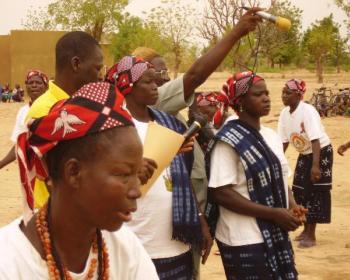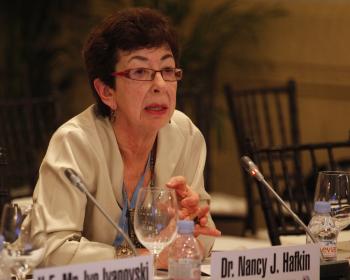International Development Research Centre (IDRC)
IDRC is APC's earliest supporter, providing the funds needed to launch APC Women’s Networking Support Programme (APC WNSP) activities around the world during the lead-up to the 1995 UN World Conference on Women (UNWCW) from 1993 to 1995 and crucial funding during the 1990's to support the pioneering stages of connectivity development in Africa through a range of initiatives. IDRC continues to support the APC network in it's work most recently through support of the APC Action Research Network (ARN) from 2010 to 2012 and the Economic Social and Cultural Rights (ESCR) project from 2014 to 2016.
IDRC has been a continual support of various Women's Rights programmes initiatives, as well as the development of our “Mission-Driven Business Planning Toolkit”. They provided start-up support to our internet rights work through the Global ICT Policy Monitor project, with a focus on activities in Latin America and Africa. In addition, APC’s Betinho Communications Prize to recognise socially meaningful uses of the internet was funded by IDRC for the first two years. IDRC also provided partial support for the APC Africa Hafkin Prize (awarded in 2001) and, in 1995, for the APC council meeting in Brazil. A full list of IDRC supported initiatives is below.
1992-1997: Connectivity in Africa initiatives
1993-1995: APC Women's Networking Support Programme
2001: Africa Hafkin Prize, Betinho Communications Prize, Global ICT Policy Monitor project, and WNSP Lessons Learned/GEM.
2002: LAC ICT Policy Monitor project, Africa Hafkin Prize, Global ICT Policy Monitor project, Gender and ICT Evaluation Methodology (GEM), and the “Civil Society and ICT Policy in Africa” workshop.
2003: The Africa Hafkin Prize, the Betinho Communications Prize, LAC and Africa ICT Policy Monitor projects, and Gender and ICT Evaluation Methodology (GEM).
2004: The Africa ICT Policy Monitor project, Gender and ICT Evaluation Methodology (GEM), Global Gender and ICT Forum, Africa Hafkin Prize 2004-2005, and Capacity building for wireless connectivity in Africa.
2005: The Africa ICT Policy Monitor, Africa Hafkin Prize 2004-2005, Betinho Communications Prize 2005, Capacity building for wireless connectivity in Africa; Institutional Support Project (INSPRO), Gender Research in Africa into ICTs for Empowerment (GRACE); GenARDIS; Wireless training workshop at the World Summit on the Information Society (WSIS).
2006: Capacity building for community wireless connectivity in Africa, capacity building and institutional support, Gender Research in Africa into ICTs for Empowerment (GRACE), the GenARDIS project, GenARDIS project evaluation, Making EASSy easy, Media and ICT policy meeting, Wireless going forward: Meeting of all wireless partners, Gender Evaluation Methodology (GEM) II, GEM workshop in Asia, and the Harambee project.
2007: Internet Governance Forum Communications and Research Grants (1 Nov 2007 to 31 Jan 2008); Positioning for the Future: Institutional Strengthening and Assessment of KICTANet (8 Jan 2007 to 8 Dec 2007); Harambee project
2008-2010: Communication for influence in Central, East and West Africa (CICEWA); Africa ICT Policy Monitor
Open access in Africa: EASSy, SAT-3/WASC research; GenARDIS: A small grants fund to address gender issues in ICTs in ACP Agricultural and Rural Development Round III; Feminist Tech Exchange
2010-2012: APC Action Research Network (ARN)
2014-2016: Economic Social and Cultural Rights (ESCR) project from 2014 to 2016
The Association for Progressive Communications (APC) takes a great pleasure in inviting you to participate in the Access to Knowledge (A2K) workshop which will be on 7 April 2010 at the Sunnyside Park Hotel in Parktown, Johannesburg. The workshop is being organised by the APC, with the support of the IDRC. The purpose of the workshop is two-fold: 1) to share the results of APC’s research to understand the scope and media piracy in South Africa; and 2) to locate and understand the demand...
The knowledge-sharing workshop will be a space to enable the 15 grantees to share outcomes as well as to discuss best practices and lessons learned. It will also be used to gather case studies and stories to feed into the ongoing programmes of partner institutions, as well as for GenARDIS’ own evaluation process. The workshop methodology will be interactive, creative and use different methodologies to encourage sharing and challenge grantees to interrogate their own learnings’. We will us...
Studies reveal that the use of information and communication technologies (ICTs) makes up 2% of all global emissions – the same amount as the airline industry. By 2012, 4.5 billion people will have access to a mobile phone – the majority will be those live on less than USD 2 a day and be the most likely to be affected by climate change. “Planting the Knowledge Seed – Adapting to cl...
In December 2007 APC members established APC’s strategic priorities for the next five years and favourably reviewed a draft action plan written by staff in December 2008. APC needs to seek funding for the action plan and consolidate the sustainability of the organisation. This project will support this process by strengthening internal organisational processes and through documenting APC as a...
The FTX will explore feminist practices and politics of technology and raise awareness on the critical role of communication rights in the struggle to advance women’s rights worldwide. Recognising the historical and current contributions of women in shaping technology, the Feminist Tech Exchange grounds technology in women’s realities and lives. Five simultaneous training tracks led by a co...
Localisation projects are often deemed as gender neutral, having a prime focus of developing localised technology only. However, in practice a number of different aspects/kinds of localisation projects could make it extremely gendered. For example, in terms of technology development, the type of job roles that are offered to men as compared to women could distinctly vary. Also the choice of ...
Trainers planning meeting in preparation for the Feminist Tech Exchange in South Africa November 10-12.
As with previous KM4Dev meetings, we want to use the opportunity of KM4Dev participants – new and old – getting together to discuss real issues with which we are dealing in our ongoing work. In other words, KM4Dev 2008 is meant to bring us together for collective thinking about a range of key challenges, solutions, experiments, and ideas with a view to helping each of us go back to ...
This workshop will focus on gender evaluation for national ICT projects from around the world, by adapting the APC Women’s Networking Support Programme’s Gender Evaluation Methodology for Internet and ICTs developed in 2002. In this second stage of GEM the methodology will be specifically adapted in four areas: localisation, national and ICT policy advocacy, rural ICT4D, and telecentres.
The Hafkin prize was established to honour Dr. Nancy J. Hafkin, a true pioneer of networking, and development information and communications in Africa, over the course of a twenty-three year career. APC’s objective is to recognize African ICT efforts, and to extract some of the lessons learned in order to make them accessible to others doing related work.

Association for Progressive Communications (APC) 2022
Unless otherwise stated, content on the APC website is licensed under Creative Commons Attribution 4.0 International (CC BY 4.0)






